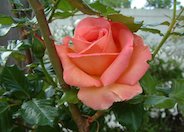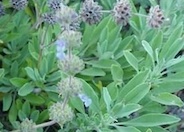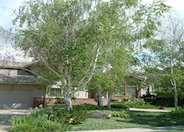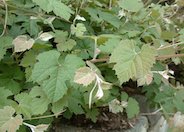
Common name:Flowering Maple
Botanical name:Abutilon hybrids
Flowering Maple usually grow to 8'-10' tall and as wide. Most will tolerate frost to 25 degrees F or lower with some damage. All are irresistible to hummingbirds with their showy flowers and heavy nectar production. They will take sun to moderately deep shade and little or no summer watering in coastal areas. They should be given more shade and water in hotter, drier climates. They make an excellent plant for containers. -Monterey Bay Nursery

Common name:Hybrid Tea Rose (selections)
Botanical name:Rosa Hybrid Tea varieties
These shrubs and vines are the most loved in the Western USA and are very resilient. They come in a wide variety of sizes and colors and are easy to maintain with proper care. They can be used in a water-conserving garden with careful attention to irrigation practices.

Common name:Sonoma Sage, Creeping Sage
Botanical name:Salvia sonomensis
This low growing, native groundcover has glaucous (covered with whitish, waxy material) green leaves with blue violet flowers that bloom in the spring and summer.

Common name:White Birch, European White Birch
Botanical name:Betula pendula
This medium-size weeping tree will grow to about 40' tall and has a whitish/brown bark with deciduous green leaves.

Common name:Queen Palm
Botanical name:Syagrus romanzoffianum
This palm has a very straight trunk to about 50' in height. It has arching, feathery, bright green, glossy leaves that can be 10'-15' long. It is fragile in heavy winds and a fast grower. It will become damaged in temperature below 24 degrees F.

Common name:California Wild Grape
Botanical name:Vitis californica
The California Wild Grape is a woody deciduous vine that with round large leaves. The flowers are in small fragrant blooms and berry clusters appear in the summer. This vine has a sprawling, climbing growth habit. The California wild Grape is native to California and is drought tolerant. It will cover up fences nicely. Grapes are ornamental.
| Designer: Jan Smithen | Cistern and Gate |
Photographer: GardenSoft |
Soils and Compost:
Incorporate compost 6" into your soil to retain water, reduce compaction, feed earthworms, and provide valuable nutrients to your plants.
Water Saving Tip:
Mulching and adding compost to soil can minimize evaporation and help soil absorb and store water.
Integrated Pest Management:
Develop healthy soil for plants that are vigorous and naturally pest-resistant.

